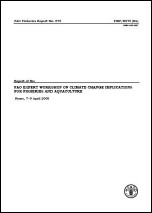
FAO Fisheries Report No. 870
Report of the FAO EXPERT WORKSHOP ON CLIMATE CHANGE IMPLICATIONS FOR FISHERIES AND AQUACULTURE
Rome, 7-9 April 2008
FOOD AND AGRICULTURE ORGANIZATION OF THE UNITED NATIONS
Rome 2008
 |
FAO Fisheries Report No. 870 Report of the FAO EXPERT WORKSHOP ON CLIMATE CHANGE IMPLICATIONS FOR FISHERIES AND AQUACULTURERome, 7-9 April 2008 |
FOOD AND AGRICULTURE ORGANIZATION OF THE UNITED NATIONS Rome 2008 |
|
| The designations employed and the presentation of material in this information product do
not imply the expression of any opinion whatsoever on the part of the Food and Agriculture
Organization of the United Nations (FAO) concerning the legal or development status of any
country, territory, city or area or of its authorities, or concerning the delimitation of its frontiers
or boundaries. The mention of specific companies or products of manufacturers, whether or
not these have been patented, does not imply that these have been endorsed or recommended
by FAO in preference to others of a similar nature that are not mentioned.
The views expressed in this information product are those of the author(s) and do not necessarily reflect the views of FAO. |
ISBN 978-92-5-106008-7
All rights reserved. Reproduction and dissemination of material in this information product for educational or other non-commercial purposes are authorized without any prior written permission from the copyright holders provided the source is fully acknowledged. Reproduction of material in this information product for resale or other commercial purposes is prohibited without written permission of the copyright holders. Applications for such permission should be addressed to: Chief, Electronic Publishing Policy and Support Branch, Communication Division, FAO, Viale delle Terme di Caracalla, 00153 Rome, Italy or by e-mail to: [email protected]
© FAO 2008
|
PREPARATION OF THIS DOCUMENT
|
| FAO. Report of the FAO Expert Workshop on Climate Change Implications for Fisheries and Aquaculture. Rome, Italy, 7-9 April 2008. FAO Fisheries Report. No. 870. Rome, FAO. 2008. 32p. ABSTRACT
|
OPENING OF THE MEETING AND ARRANGEMENTS FOR THE SESSION
OBJECTIVES OF THE EXPERT CONSULTATION
REVIEW OF THREE TECHNICAL BACKGROUND DOCUMENTS
CONCLUSIONS AND RECOMMENDATIONS
CLOSING OF MEETING
APPENDIXES